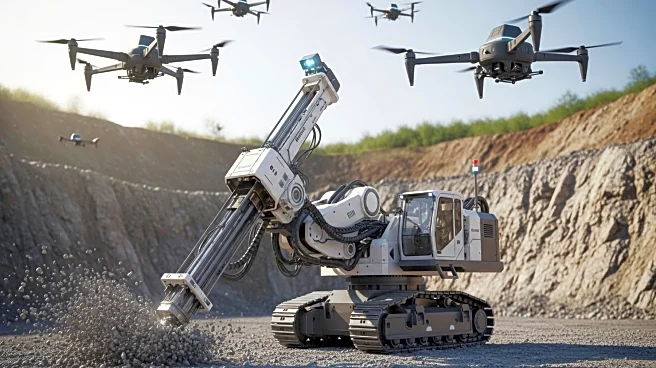What is the story about?
What's Happening?
The mining industry is undergoing significant transformation driven by advancements in technology, particularly artificial intelligence (AI). As outlined in Mining.com.au's 2030 Outlook series, AI is revolutionizing resource management, enhancing productivity, and reshaping capital pricing in the sector. The Minerals Council of Australia highlights the role of technology-led productivity growth in increasing commodity consumption, driven by the transition to zero emissions energy. AI and robotics are improving efficiencies, decision-making, and fiscal responsibility in mining operations. Companies are integrating AI with operational technology to optimize resources, reduce energy consumption, and predict equipment failures. Reports indicate that AI adoption has led to substantial productivity gains, with some companies achieving up to 25% improvement in workforce productivity and significant reductions in operational costs.
Why It's Important?
The integration of AI in the mining sector is crucial for enhancing productivity and sustainability. As the industry faces increasing demand for battery metals and renewable energy technologies, AI provides a competitive edge by optimizing operations and reducing costs. This technological shift is essential for meeting global needs for metals like lithium, uranium, copper, and nickel, which are vital for electric vehicles and renewable energy systems. The adoption of AI also addresses challenges in data management and operational efficiency, enabling mining companies to better navigate the complexities of environmental, social, and governance (ESG) reporting. As AI becomes more embedded in mining operations, it offers opportunities for improved profitability and resource management, positioning companies to better meet future demands.
What's Next?
The mining sector is expected to continue its adoption of AI technologies, with mid-sized companies leading the way. Over the next five years, AI is anticipated to become more integrated into various parts of mining organizations, focusing on productivity and efficiency. Companies are likely to explore AI-driven solutions for ESG reporting and capital pricing, aligning with international sustainability standards. As AI adoption grows, mining companies will need to address challenges related to data integration and privacy concerns. The sector may also see increased collaboration with tech firms to enhance AI capabilities and drive innovation in resource management.
Beyond the Headlines
The broader implications of AI adoption in mining extend to ethical and environmental considerations. As AI optimizes resource use and reduces energy consumption, it contributes to the industry's sustainability goals. However, the reliance on AI also raises questions about data privacy and the need for skilled expertise in managing AI systems. The shift towards AI-driven operations may redefine workforce roles and require new skill sets, impacting employment patterns in the sector. Additionally, the focus on ESG reporting and sustainable practices may influence investment decisions and regulatory frameworks, shaping the future of mining operations globally.
















